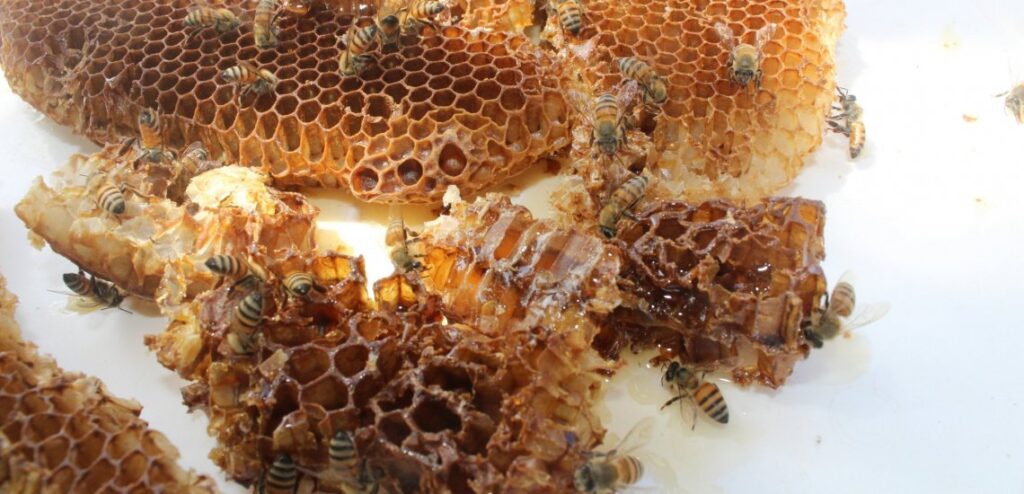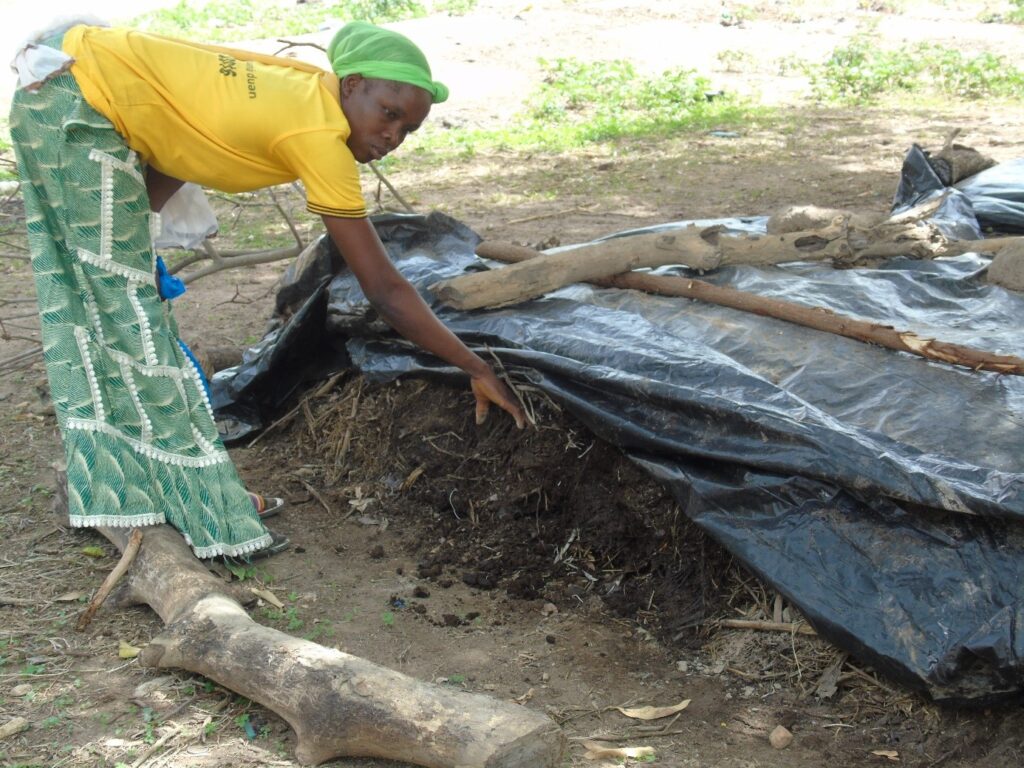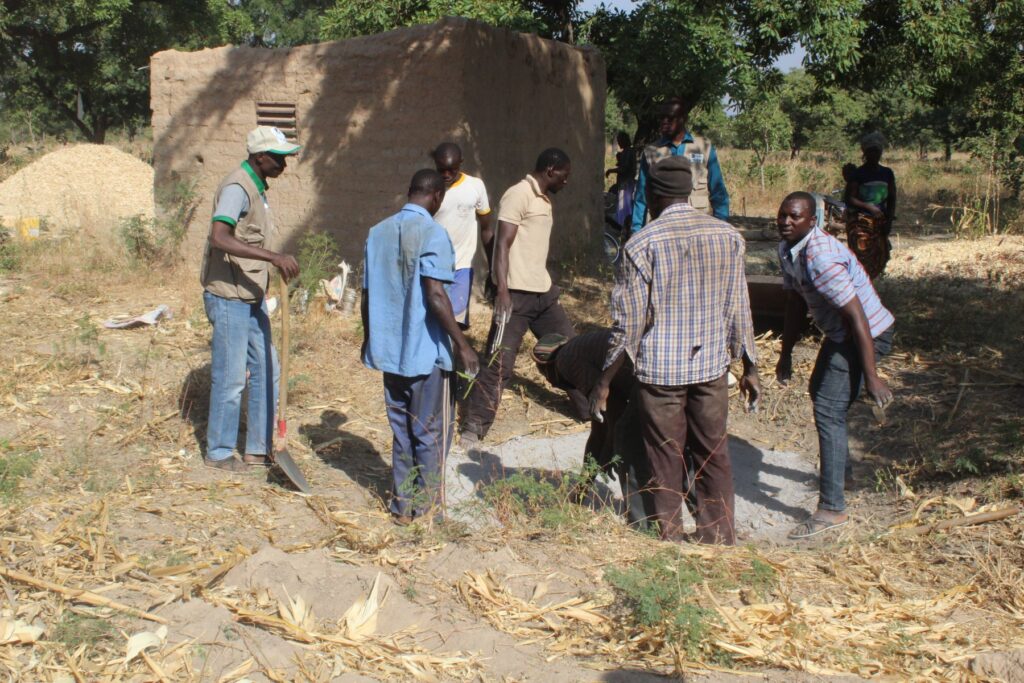Natural compost helps women farmers in Burkina Faso get better yields

Natural compost is a reliable alternative to chemical fertilizers in improving agricultural yields for women farmers in Burkina Faso, while promoting conservation of micro-organisms and insects, ensuring the survival of migratory birds and optimal pollination of crops.
By Seydou Nacro
Alizèta Biyen, a farmer in Léo (a town situated about 160 km south of Ouagadougou in Burkina Faso), strolls calmly across her family’s two hectares of land. The morning breeze sweeps across her face and the chirping of birds can be heard through the surrounding trees. With a daba (a tool similar to an adze) perched on her shoulder, her eyes gaze into the distance, inspecting her piece of land. For some time, like many farmers in the region, she has been experimenting new agricultural practices based on natural compost.
Back from the fields, the sun’s rays slowly creep through the foliage and the temperature begins to rise. But Alizèta certainly doesn’t care; she is more interested in the piles of freshly cut shrubs she is about to burn. She is currently a first-year preparatory student at the School of Natural Composting and is applying her first lessons. She has set up two compost heaps and confidently shows us one of them:”I can proudly tell you that in addition to fulfilling my promise to use natural compost, I expect to get better yields, if Mother Nature is generous. My husband promised to help me transfer the first heap of compost to the piece of land he gave me sometimes next week. If some compost remains, I will donate that to my husband for the family field.”

The young woman benefited from a training programme on how to prepare natural compost. This was made possible through the initiative dubbed “Birds – Bees – Business” – part of the Projet d’appui à la diversité biologique et à l’économie verte or (PADEV-BBB) – a project in support of biological diversity and the green economy funded by the National Postcode Lottery and implemented in four provinces of Burkina Faso. The four-year project is being implemented by ICCO Cooperationen in collaboration with Vogelbescherming Nederland (VBN, BirdLife Partner), and the Fair Climate Fund.
Alizèta is busy preparing her farm for the planting season. Those who started using natural compost before her have been getting good yields year after year. According to her, the training was very inspiring: “The compost heap preparation technique that I learned can be easily applied by women. One doesn’t need to use cement to stabilize the pit. The technique requires the use of large quantities crop residues and a small amount of manure. It is the easiest way for me since I know how to collect crop residues.”
For Alizèta, chemical fertilizers are a distant memory.”During the last season, my husband and I spent more than 150 euros on pesticides and fertilizers. We made a lot of sacrifices just to be able to buy these inputs. Despite the efforts, we did not harvest much,” says Alizèta.
Chemical inputs have shown their limits in improving agricultural yields among small household farmers in Burkina Faso. Undeniably, these artificial inputs have a negative impact on soil fertility in the long term because of their harmful effects on microorganisms; consequently contributing to increased food insecurity. Moreover, the cost of these inputs remains beyond the reach of vulnerable producers: more than 25 euros for a 50 kilogram bag of NPK fertilizer. Even though the production and use of organic manure has long been popularised, its adoption by women is still hindered by the gruelling task of digging manure pits.
To address this challenge and improve crop yields, Naturama (BirdLife in Burkina Faso) is promoting the use of compost among small-scale farmers by opting for heap composting. “This technique has an advantage: it requires neither heavy labour nor financial resources. In addition, one only requires 45 days to produce compost. This is in line with the reality of small-scale household farmers, especially women and young people,” says Adama Nana, head of the PADEV-BBB project. The project subsidized training of farmers in the use of this technique. Participants were provided with farming kits to help in the implementation of the technique on their farms

Through this initiative, 2,659 small-scale subsistence farmers were trained in the first year of the implementation, including approximately 1,129 women who were trained in the production of compost heaps. With the application kits they received, 1,600 farmers managed to produce compost for the current season.
This project activity falls within the “Trees-Insects-Birds” strategy, whereby the use of compost plays a key role in improving crop yields, conserving micro-organisms and preserving insects, thereby ensuring the survival of migratory birds as well as optimal pollination of crops and production of non-wood forest products. The participants in the activity clearly understood how easy it was to produce organic manure.”We understand that we must always put manure in our fields if we want to maintain the fertility of our soils for a long time in order to bequeath them to our offspring and also to improve production,” said Alizèta Biyen. In the subsequent farming seasons, the beneficiaries will be retrained to act role as models in the villages where the project is being implemented, and another group will benefit from the same training to ensure promotion of this good practice within the villages.
Latest news from Africa
Stay up to date
Sign up to receive the latest bird conservation news. You’ll also receive updates about our projects, science and other ways to get involved including fundraising.
Thank you for your support, we are committed to protecting your personal information and privacy. For more information on how we use your data, please see our Privacy Policy. You can unsubscribe from emails at any time by using the link in the footer of any email from us.




